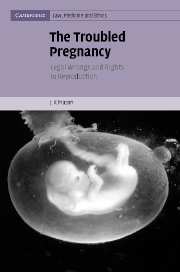Book contents
- Frontmatter
- Contents
- Preface
- Table of cases
- Table of statutes
- 1 The nature of the troubled pregnancy
- 2 Voluntary and involuntary termination of pregnancy
- 3 Antenatal care and the action for wrongful birth
- 4 Unsuccessful sterilisation
- 5 Uncovenanted pregnancy and disability
- 6 Wrongful neonatal life
- 7 The management of the disabled neonate
- 8 Conclusion
- Bibliography
- Index
1 - The nature of the troubled pregnancy
Published online by Cambridge University Press: 19 July 2009
- Frontmatter
- Contents
- Preface
- Table of cases
- Table of statutes
- 1 The nature of the troubled pregnancy
- 2 Voluntary and involuntary termination of pregnancy
- 3 Antenatal care and the action for wrongful birth
- 4 Unsuccessful sterilisation
- 5 Uncovenanted pregnancy and disability
- 6 Wrongful neonatal life
- 7 The management of the disabled neonate
- 8 Conclusion
- Bibliography
- Index
Summary
Introduction
Most academics have difficulty in writing their monographs and I must certainly count myself among that majority. I can, however, go one stage further and admit to having had a comparable difficulty in finding a title. In planning their families, most people would opt for an ideal number of ideal children. Life, however, is far from ideal and my aim has been to collate and review the development of the law as it now relates to human reproduction that has gone contrary to plan – contrary in the sense that the problems have strayed beyond those that can be settled within the doctor/patient relationship and which, as a result, require some legal control of the outcome.
Inevitably this implies that there is, at source, some form of conflict between the three principals – the pregnant woman, her fetus and her medical adviser. One's consequent reaction is to see these as encompassed within the mantle of ‘unwanted pregnancy’ and, certainly, a very large number of pregnancies are genuinely unwanted. At the same time, by far the greater proportion of these will be resolved between the woman and her doctor within the abortion clinic and I should make it clear that, while I consider lawful termination of pregnancy at considerable length in this book, I do so with some reluctance insofar as I am not concerned with abortion per se – and certainly not with abortion on what are often described as the ‘social grounds’.
- Type
- Chapter
- Information
- The Troubled PregnancyLegal Wrongs and Rights in Reproduction, pp. 1 - 13Publisher: Cambridge University PressPrint publication year: 2007



